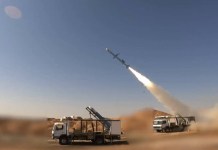The UAE took another step to become one of the most powerful Islamic nations in the world after they officially signed the historic normalization pact with Israel which could give Abu Dhabi access to the latest American military hardware including the much-sought-after F-35 jets.
Is The Indian Air Force A Potential Buyer For The New Russian Super Sukhoi Fighter Jets?
Representatives of Israel, UAE, and Bahrain converged with the United States government to sign the historic normalization accord between the Gulf Nations and Israel at the White House in Washington on Tuesday (September 15).

The agreements, dubbed as the “Abraham Accord”, makes the UAE the third Arab nation and the first in the Gulf Cooperation Council (GCC) to establish relations with Israel, thereby shifting the balance of power in the Middle East and putting an end to a decades-old taboo in the Arab diplomacy.
US President Donald Trump addressed a crowd outside the White House after the signing of the agreements and highlighted the significance of the historical accords.
“Today’s signing sets history on a new course. This (is) an incredible day for the world.”
The agreement puts a timely end to UAE’s economic boycott of Israel, thereby opening the doors for the US to sell advanced weaponry to the Arab nation, which has had its heart set out on acquiring the prestigious Lockheed Martin F-35 fifth-generation fighters.
According to William Hartung, Director of the Arms and Security Program at the Centre for International Policy (CIP) in Washington DC, the sale of arms has been an “important factor” in the historical accord.
While speaking to Al Jazeera, Hartung said that the UAE has been chasing the F-35 fighter jets and larger drones from the US, but was denied by the Trump administration due to the US’ commitment to Israel’s military advantage.
UAE Foreign Minister Anwar Gargash, while speaking to Reuters on Tuesday stressed on how the latest agreements should eliminate “any grain of doubt” on the Gulf state’s potential procurement of the F-35 fighters from the US.
“The UAE seeks like any country that takes its military seriously, to modernize its military, always, so our request for the F35 and other systems pre-dates this agreement,” said Gargash, while highlighting the need for the renewing of UAE’s existing fleet of two-decade-old US F-16 jets.
Donald Trump on Tuesday had said that he would be willing to sell the same weapons systems which were sold to Israel to countries in the Middle East while noting the region’s wealth.
“They’re very wealthy countries for the most part,” said Trump, while speaking to Fox News. While addressing UAE’s interest in buying the F-35 stealth fighters, Trump said – “I personally would not have a problem with it. Some people do, they say… maybe they go to war.”
Despite the signing of the accord, Israeli Prime Minister Benjamin Netanyahu has said his government will oppose any U.S. F-35 warplane sales to the UAE.
For long, Israel has maintained a military edge over the region with the help of the US, which has exclusively sold its most advanced weapons to the Jewish nation, and now Netanyahu is wary of the possibility of a major shift in its qualitative military edge in the region.
Experts talking to the EurAsian Times contemplated that with the UAE inching close to the US and Israel, and Turkey, a major NATO ally, drifting away from the Western block, is the UAE aspiring to replace Turkey as the most powerful Islamic military power in the world?




